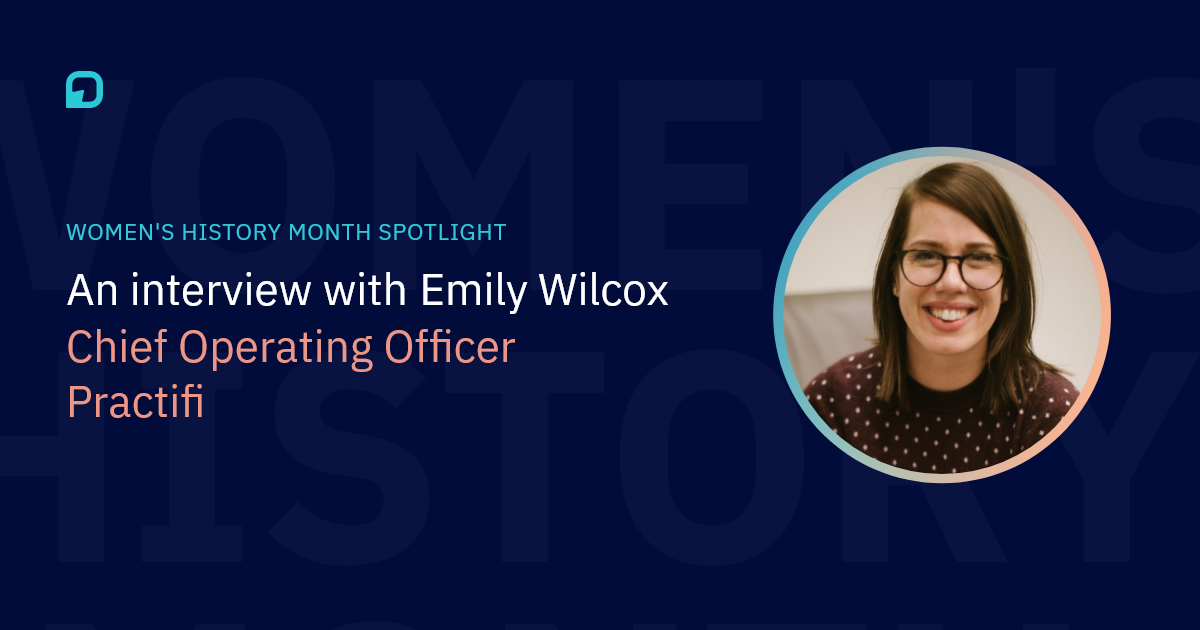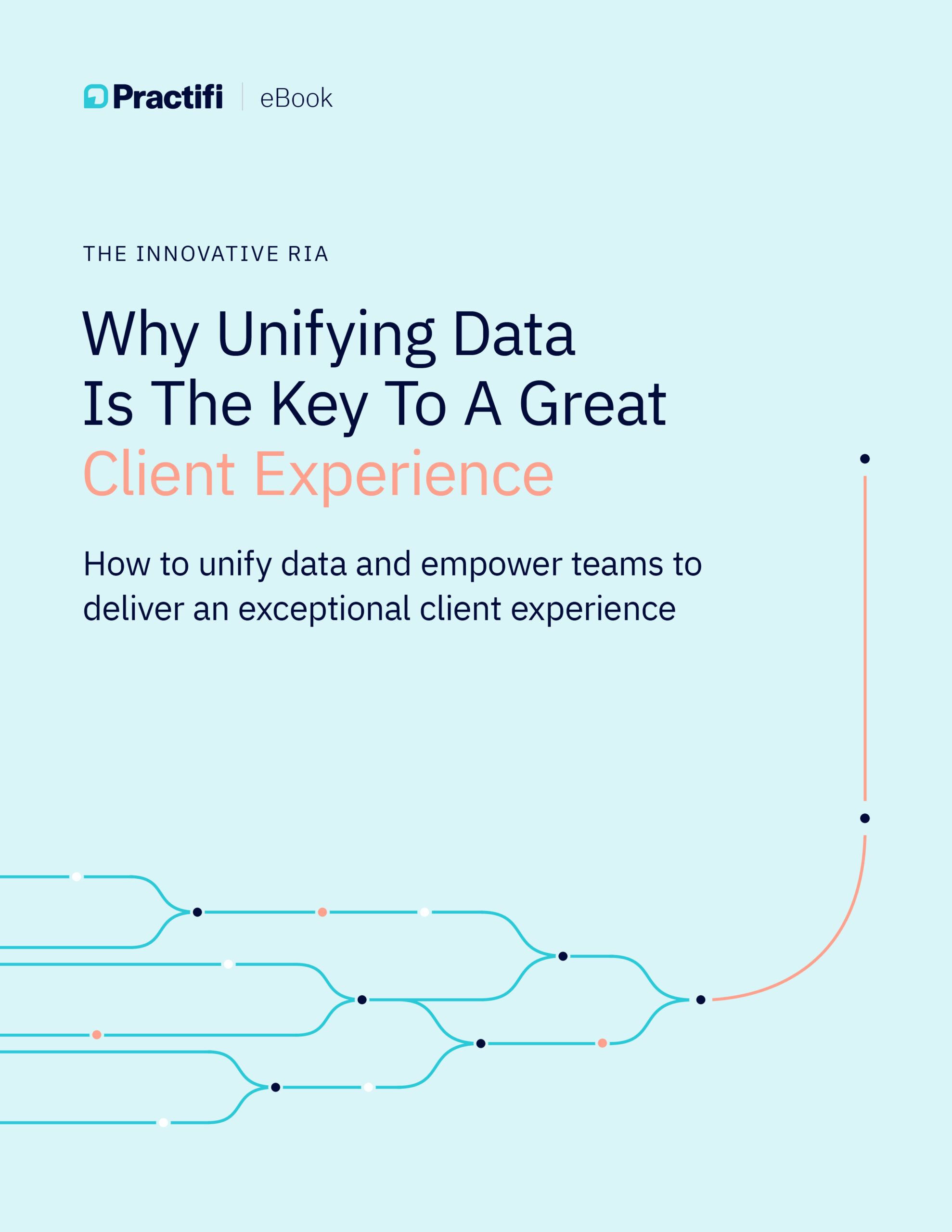
Women’s History Month Spotlight with Emily Wilcox

BY Team Practifi
In celebration of Women’s History Month, we want to shine a spotlight on the incredible contributions and journeys of women within and outside of Practifi. In this special series, we are honored to feature five remarkable women leaders who have forged their own paths within the wealth management and finance space. Through their stories and insights, we aim to not only celebrate their achievements but also gain valuable perspectives from their experiences navigating and excelling in a traditionally male-dominated industry.
Introducing Emily Wilcox, Chief Operating Officer at Practifi, whose remarkable story is a testament to resilience and ambition. From her humble beginnings at Queensland University of Technology (Law) to her pivotal role at Practifi. Emily’s journey unfolds with a blend of determination and passion. In this interview, Emily takes us on a journey through her early career, sharing the pivotal moments and formative experiences that paved the way for her ascent in the finance industry.
From Campus to C-Suite
Following her law degree from Queensland University of Technology (Law), Emily found herself at a crossroads, unsure of her career path. However, her journey took a decisive turn when she joined Practifi in its nascent stages. Starting from a role in administration, Emily’s trajectory within the company has been nothing short of remarkable.
Q: Can you tell us about your journey into the finance industry and how it began?
A: I pursued a law degree at Queensland Universityin Australia. However, about halfway through my studies, I came to the realization that a career as a lawyer wasn’t the right fit for me. It became evident that I was searching for something different. Fortunately, I had the opportunity to transition into the workforce post-graduation. In 2015, I began working at Practifi just doing admin. At that time, Practifi was in its early stages, having recently acquired clients. There wasn’t much of a real company structure or anything happening at that point. So, I came in and did generalized ops stuff and tried to help get things set up and running.
Honestly, it was an awesome opportunity for someone like me who was uncertain about their career path. I got to touch a lot of different things in a company that you don’t get to in a slightly bigger organization. As a result, I was able to learn and work through a large variety of challenges. Even to this day, I like being given complex problems that I have to figure out and solve myself. It’s always been a strength of mine. As Practifi grew, I was able to work across all sorts of different roles. So I’ve kind of done most roles in the company at one point or another.
I did leave Practifi for a brief period, right before our expansion into the U.S. However, I didn’t stray far — I worked with project teams at a large insurer in Australia, implementing technology. Although I left Practifi, I was doing very similar kinds of work, but just looking at it from the other perspective. I was on the customer side of implementing technology rather than the supplier side, so it gave me a nice unique view of how things work.
Then I came back to Practifi, and I moved to the US to help lead that expansion. That was five years ago. It started with just me and then we had a couple of extra people join the team when I first moved here. We’ve grown it up to now a team of 55 people. Now, I’m the COO of Practifi, and I’ve been here for a very long time, nine years, I believe.
Turning Setbacks into Success
From charting a course through the male-dominated terrain of fintech to surmounting personal and professional obstacles, Emily’s journey has been marked by formidable challenges. Her path serves as a vivid illustration of the power of perseverance in the face of adversity. Emily offers a candid reflection on the obstacles she encountered, providing invaluable insights into the strategies she employed to emerge stronger.
Q: Reflecting on your career, what were some challenges you faced and how did you navigate them?
A: It’s interesting, right? Because we work in fintech, the cross-section of finance and technology — both of which are male-dominated industries. If we’re thinking of gender as binary (which is obviously only two parts of the story), fintech is very men-heavy, and even more so in senior positions. It was not unusual for me, especially in the earlier days of being in the U.S., to be the only woman in the room — and not just the only woman but also the youngest by a lot because I was in my late 20s when I moved here.
From my perspective, I decided early on, firstly, that I was privileged to have the opportunity to do what I do. Obviously, I’m aware that not everyone has the same chances, so I’m thankful for what I have. But I also decided that I wasn’t going to be nervous — to remind myself that I deserved to be in the room.
That mindset really boosts confidence in such situations, as they can often feel overwhelming or leave you feeling out of place. But what I’ve learned is that many people in senior positions, regardless of gender, don’t have all the answers. No one is an expert on everything, and everyone needs assistance with various tasks and challenges.
So, I made a conscious decision never to feel overpowered or overshadowed when I’m in a room. That feels important. Because I know what I know, and my opinion is important. It sounds a little bit arrogant, but sometimes you need to be a little bit arrogant to feel comfortable in those rooms. That’s a common thing that a lot of women in our industry face honestly. It’s not rare to be the only woman in the room and that can feel a little bit all-consuming sometimes.
Also, a lot of the time, especially as a younger woman, I think you can feel people underestimate you. Which in some ways can be understandable, but at the same time, it gives you an opportunity to prove them wrong — which I try to do whenever I can.
Shaping Tomorrow: Takes on Industry Evolution
As the Chief Operating Officer at Practifi, Emily offers invaluable perspectives on the changing landscape of the finance industry. Drawing from her experience, Emily sheds light on the importance of leadership, diversity and inclusion in driving innovation. She shares her vision for the future of finance, emphasizing the need for adaptability and inclusivity in shaping tomorrow’s industry.
Q: Since you’ve started your career, how do you think the industry has evolved in terms of diversity inclusion?
A: I don’t know if it’s the industry or if it’s my awareness of things. I guess both things can be true at the same time, but it feels to me that more and more people are becoming aware of the inherent inequalities around women.
From grassroots initiatives (like Girls Who Code) to women’s executive groups, women are feeling more empowered to address and solve inequality. I think, broadly speaking, it’s just louder. There’s more happening around it, there’s more interest in what women are doing because what they’re doing is really awesome.
In a perfect world, accomplishments like being the first woman to achieve something wouldn’t be highlighted as exceptional — it would simply be seen as normal because equality would be inherent. I think one of the big differences I’ve seen is just how much more we talk about it. How much we talk about women in finance, women in technology and the opportunities available to them. And there are groups and organizations that are dedicated to helping reduce the inequality that does exist. That’s more prevalent now than it was 10 years ago.
Q: At a leadership level, what are your thoughts on the current level of representation of women in leadership roles in the industry?
A: I think women are slowly but surely getting more representation. As far as the volume, it is hard to say, to be honest. Even as simple as looking at LinkedIn, I often see women as the focal point of a lot of the commentary and opinions. There’s always more that we can and should be doing to make that go more quickly, but I also am realistic about how quickly that can move. Obviously, I would love it to be 50/50 everything tomorrow, but I do realize that it takes time and effort.
Q: Do you feel companies have an obligation to promote and support women to take leadership roles?
A: Yes, I do. There’s a natural inclination to seek out examples of other women who have pursued similar paths as you. It’s like the old adage, “You believe what you can see.” When you see women, girls, and gender-fluid individuals succeeding in certain fields or roles, it reinforces the belief that you can do it too.
The more we discuss and actively address gender equality, the more visible our presence becomes organically. It’s about recognition — while discussions about gender equality were once limited to smaller circles 15 to 20 years ago, they’re now gaining traction, particularly from a corporate social responsibility perspective. I think it’s a tricky ground to tread, with various viewpoints on quotas and positive bias. At our organization, we prioritize addressing unconscious bias, striving for total equality in all aspects—from the recruitment process to promotions. Ideally, gender shouldn’t even be a factor.
It’s also not something that you can fix overnight. Do we have a responsibility? Yeah, I think we have a responsibility to talk about the success of women in the context of the company.
Q: What changes or improvements would you like to see in the industry moving forward?
A: It kind of all comes down to education. Education, opportunities and connections. Because no matter what anyone says, a lot of times the door gets opened because of someone that you know. Not always, but it’s a lot. It’s figuring out ways to infiltrate parts of the community, and that can happen through community groups like universities, work experience programs and internship programs.
Q: What advice would you give to young women aspiring to enter the wealth managment tech sector?
A: Be confident in what you know. Trust yourself in that you can figure it out — because if you’re smart or intelligent, you can. Even if you’re not sure, you should do it.
When reading a job posting, you might notice that you lack one specific requirement out of the many listed. Many men are more likely to back themselves into that role despite this. In contrast, most women tend not to. I feel like we need to have a little bit more faith in our abilities and, honestly, give it a shot. Say yes. Figure it out as you go, trust that you can figure it out, and trust in your abilities.
Emily’s journey serves as a reminder that with perseverance and determination, any obstacle can be overcome, and success can be achieved. We extend our deepest gratitude to Emily for generously sharing her experiences and insights, and providing invaluable lessons for aspiring professionals in the fintech industry and beyond.









